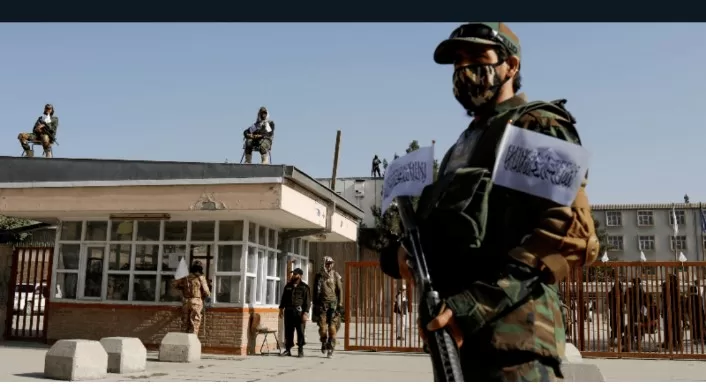KABUL – In a notable development, the Taliban is actively working on establishing a comprehensive camera surveillance network throughout Afghan cities, potentially drawing inspiration from a plan initially devised by the United States before its 2021 withdrawal. An official spokesperson from the Afghan Interior Ministry disclosed this information as authorities aim to bolster the existing array of thousands of cameras within the capital, Kabul.
The Taliban administration, which has publicly declared its commitment to restoring security and combating the militant Islamic State group, responsible for numerous devastating attacks in Afghan cities, has reportedly engaged in discussions with the renowned Chinese telecommunications equipment manufacturer, Huawei, regarding potential collaboration in this endeavor.
The pivotal focus of these interactions between the Taliban and various foreign nations, including the United States and China, is to prevent international militant groups, including the formidable Islamic State, from launching further attacks on Afghan soil. However, some analysts remain skeptical of the financially strained regime’s ability to fund such an ambitious program, while human rights groups express apprehension that these resources could be diverted to suppress protests.
It should be noted that prior to this report, details concerning the Taliban’s plans to expand and manage mass surveillance, including the acquisition of the U.S. plan, had not been made public.
This large-scale rollout of surveillance cameras, with a particular emphasis on “strategic points” within Kabul and other urban centers, constitutes a central component of a new security strategy projected to take four years for full implementation, as confirmed by Abdul Mateen Qani, the spokesperson for the Ministry of Interior, in an exclusive interview with Reuters.
Qani elaborated, stating, “Presently, we are diligently crafting a security map for Kabul, a meticulous effort undertaken by security experts that demands significant time and effort. We presently possess two maps, one prepared by the United States for the previous government and the other by Turkey.”
The timeline for the creation of the Turkish plan was not specified.
Responding to queries, a spokesperson from the U.S. State Department emphasized that Washington is not in any form of partnership with the Taliban, reiterating the importance of the Taliban ensuring that they provide no safe haven for terrorists.
As of the time of reporting, a spokesperson from the Turkish government had not responded to requests for comment.
Regarding the discussions with Huawei, Qani revealed that the Taliban engaged in a preliminary conversation about the potential surveillance network back in August. However, no contracts or definitive plans have been established.
In a previous report from Bloomberg News in August, it was suggested that Huawei and the Taliban had reached a “verbal agreement” regarding a contract for the installation of a surveillance system, citing an insider source. Nonetheless, in September, Huawei communicated to Reuters that “no plan was discussed” during the said meeting.
While a spokeswoman from the Chinese Foreign Ministry claimed to be unaware of specific discussions, she emphasized China’s consistent support for the peace and reconstruction efforts in Afghanistan and its endorsement of Chinese enterprises engaging in pertinent practical cooperation.
Currently, there exist over 62,000 surveillance cameras within Kabul and other urban areas, all monitored from a centralized control room, as stated by the Taliban. Notably, the last major update to Kabul’s camera infrastructure took place in 2008, during the tenure of the previous government, which relied heavily on Western-led international forces for security.
Human rights advocates and critics of the Taliban regime voice concerns that the enhanced surveillance may be utilized to target members of civil society and suppress protests.
Although the Taliban rarely confirm arrests, the Committee to Protect Journalists reports that at least 64 journalists have been detained since the group’s takeover. Moreover, protests against restrictions on women’s rights in Kabul have allegedly been forcefully dispersed by security forces, as attested by protesters, video evidence, and Reuters witnesses.
The prospective implementation of a mass surveillance system, ostensibly under the banner of “national security,” raises apprehensions among critics, as it potentially sets a precedent for the Taliban to continue implementing draconian policies that infringe upon fundamental rights, as articulated by Matt Mahmoudi of Amnesty International.
In contrast, the Taliban vehemently denies that an upgraded surveillance system would encroach upon the rights of Afghan citizens
By Reuters.







